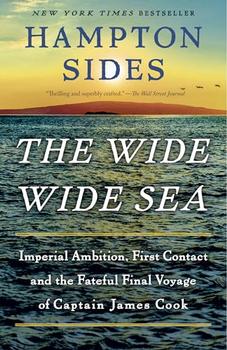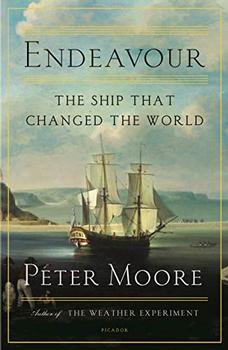Summary | Excerpt | Reading Guide | Reviews | Beyond the book | Read-Alikes | Genres & Themes | Author Bio

Imperial Ambition, First Contact and the Fateful Final Voyage of Captain James Cook
by Hampton SidesBy 1775, 48-year-old Captain James Cook had completed two highly successful voyages of discovery and had earned a comfortable retirement. The Admiralty gave him a plum position: an honorary post at Greenwich Hospital near London, where his only responsibility was to "keep a paternal eye on the thousand or so Navy pensioners" who lived there. He quickly became bored, however, and longed to be back on the open ocean. His restlessness was exacerbated when he learned that the Admiralty was planning an expedition to look for the fabled Northwest Passage from the Pacific side—something that had never been attempted—and had assigned his former ship, the HMS Resolution, to the task. The powers that be, too, felt that Cook was the only man who could pull off such a journey, and so manipulated him into asking for the commission (which doesn't appear to have been much of a challenge). In July 1776 Cook left England on his final—and fatal—voyage. It's this tale of exploration and tragedy that Hampton Sides relays in his nonfiction account, The Wide Wide Sea.
The author tidily sums up his task: "This is not a biography but a narrative history with a large, diverse cast of characters…It's the story not only of James Cook but of the men who accompanied him on his swan-song voyage to the Pacific. They took part in a monumental enterprise that left lasting impacts, good and bad, on the world." It would seem like an enormous task to describe all that occurred on the expedition—over three years, Cook sailed from England to New Zealand, Tahiti, Hawai'i and the Bering Strait. But in The Wide Wide Sea, Sides does what he does best: condenses a complex subject into an eminently readable, compelling story—a true account that reads like a novel. Although he doesn't break new ground—Cook and his voyages have been the subjects of many books—he does approach his topic with fresh eyes, acknowledging Cook's tale is a "morally complicated" one and allowing current debates about the explorer's cultural impact to inform the narrative.
It's unfortunate that there are so few records of Cook's actions from the perspective of the residents of the lands he "discovered," but many of Cook's men left behind journals. Sides laboriously combed through an extensive trove of documents squirreled away across the globe, combining the many sources to paint a nuanced picture of the captain and events that transpired on the journey. He's an expert in providing enough detail to get readers hooked on a story without allowing it to bog down the book's flow, and his skill is on full display here.
Also quite interesting is the author's attempt to understand Cook's increasingly erratic behavior as the journey wore on. I've read a number of books about Cook's expeditions, but I don't recall conjecture as to why he became so irrational toward the end of his life. Sides clearly draws the line between fact and speculation on this matter and others throughout, something I appreciate in works of narrative nonfiction.
The author claims not to "lionize, demonize nor defend" Cook, but I still found the portrayal fairly sympathetic. The captain and crew certainly had a negative impact on the people and cultures they met, but nevertheless Sides claims that Cook was one of the more socially enlightened navigators of the age. The author sees him as an anthropological observer, interested in understanding the cultures of those he met rather than dismissing them as inferior. He also excuses some of the side effects of European contact (e.g., venereal diseases, rats) as happening regardless of this specific voyage; the ills likely would have been introduced by the first European vessel to land, and that ship just happened to be Cook's. Although I understand the points he makes, I found I wasn't completely convinced by them, at least not enough to overcome my discomfort with the interactions between the explorers and the Indigenous populations they encountered. That said, the account is a factual one, and Sides makes no attempt to ignore the expedition's misdeeds, even though he might try to rationalize them.
The Wide Wide Sea's subject matter is challenging from a 21st-century perspective; statues of Cook have been torn down worldwide, viewed as symbols of European exploitation. But we should keep in mind that the book is, at its core, history, and as such the events portrayed here need to be understood and remembered. And readers can't go wrong with a book by Hampton Sides, a master at penning marvelously readable history. I highly recommend it for a wide audience, including those who don't usually read nonfiction.
![]() This review was originally published in The BookBrowse Review in April 2024, and has been updated for the
July 2025 edition.
Click here to go to this issue.
This review was originally published in The BookBrowse Review in April 2024, and has been updated for the
July 2025 edition.
Click here to go to this issue.

If you liked The Wide Wide Sea, try these:

by David Grann
Published 2025
Winner: BookBrowse Nonfiction Award 2023
From the #1 New York Times bestselling author of Killers of the Flower Moon, a page-turning story of shipwreck, survival, and savagery, culminating in a court martial that reveals a shocking truth. The powerful narrative reveals the deeper meaning of the events on The Wager, showing that it was not ...

by Peter Moore
Published 2020
An unprecedented history of the storied ship that Darwin said helped add a hemisphere to the civilized world.
Your guide toexceptional books
BookBrowse seeks out and recommends the best in contemporary fiction and nonfiction—books that not only engage and entertain but also deepen our understanding of ourselves and the world around us.